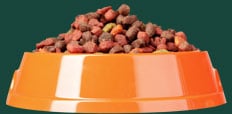"In 2001 a very special little kitten came to stay at our house named Emma. She weighed in at a whopping 2 ½ pounds. When she was about 9 months old she began vomiting and wouldn’t eat. The doctors at Piney Creek Square Veterinary Clinic took x-rays, but nothing showed up on them. She was losing weight, and she was thin by nature anyway, so everyone was worried about her. Dr. Behrns came to the rescue and performed emergency surgery on our little girl. She found an almond trying to pass into Emma’s stomach. Of course, it would not have shown up on an x-ray. Thank you, Dr. Behrns, for saving Emma’s life."
-Margo K.
Geriatric cats (8 years of age or older) can develop significant weight loss, increased drinking, increased urination, vomiting and/or diarrhea for various reasons. Most commonly, as doctors, we think of ruling out three common conditions in elderly cats presenting with these signs: hyperthyroidism, diabetes mellitus, and chronic kidney failure.
Now there are some purebred cats, such as Persians, that statistically exhibit a higher incidence of kidney failure but no type of cat, purebred or otherwise, is exempt from this disease. Since the signs can be more anomalous, bloodwork and a urinalysis are necessary to discern kidney disease from other conditions.
Veterinary medicine has many options to offer in the management of kidney failure in cats, including kidney transplants! However, the typical course for addressing a cat’s kidney disease after lab results are obtained depends directly on how compromised your cat’s health is and how high and out of range the kidney values are out of normal. By the time elevations in kidney values are seen, it is approximated that 75% of their filtering capacity is already gone.
Recommendations can vary from a mere diet change to medications and subcutaneous fluids (fluids administered under the skin) to admission to one of our local emergency/critical care facilities for aggressive intravenous (IV) fluid therapy and injectable medications administered usually over three days/72 hours, minimum. The intensity of care can be directly dependent on how soon an owner recognizes changes in their cat’s appearance and appetite.
We understand that can be tough in a multi-cat household but splitting pets up to find the cat that is either inappropriately urinating, vomiting or not eating can be helpful. If you feel your pet is exhibiting signs similar to kidney disease, call the staff at Piney Creek Square Integrative Veterinary Medicine to schedule an appointment.
Additional information regarding this condition can be found at the following links:
Seasonal Tips & More
Our Professionals
Make An Appointment
Request a Refill
PINEY CREEK SQUARE
INTEGRATIVE VETERINARY MEDICINE
15420 E Orchard Rd
Centennial, CO 80016
HOURS
Monday through Friday from 8:00 a.m. – 6:00 p.m.
Closed from Noon to 1:30 p.m. for lunch
Closed Saturday’s, Sunday’s and major holidays.
© 2022 PINEY CREEK SQUARE INTEGRATIVE VETERINARY MEDICINE
While we often refer to clients to these resources, their inclusion on Piney Creek Square Integrative Veterinary Medicine’s site does not constitute an endorsement unless otherwise stated. Piney Creek Square Integrative Veterinary Medicine is not responsible for any outdated or incorrect information or links from these sites.

Website by Mad Cow Web Design